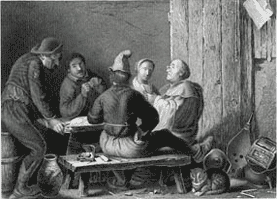The History Of Texas Holdem
Never in the history of poker has it been as popular as it is right now. The most played poker game is definitely Texas Holdem. All over the world people are playing Texas Holdem games and there seems to be no end to the popularity of the game. Especially playing Texas Holdem for free on the internet has became extremely popular in the last couple of years.
Who actually invented this great poker game? Where did it originally come from? And how did free Texas Holdem games end up on the internet?
To answer these questions it is important to trace back the history of poker, to find out where it all began…
History of Poker Theories

- What follows is a well-researched account of the trail Texas Hold ‘Em has trodden to become the phenomenon it is today. Invented by nomadic Druids ca. The 3rd Century CE, its name originally could only be pronounced by a well-squeezed wolf.
- The following year, Hold’em further cemented its foothold in elite poker circles. In 1970, father and son team, Benny and Jack Binion rebranded the former Gambling Fraternity Convention to the World Series of Poker. In 1971, the duo showcased Texas Hold’em as the main event of the tournament. Yes, first-year numbers were relatively small.
- History of Texas Hold’em Poker Texas Hold’em game, as the name suggests, originated in Texas in the early 1900s. The Texas State Legislature officially recognizes Robstown City as the game’s original place of origin. Here are some interesting things about the card game –.
There are many different theories about how poker came into this world and their seems to be no real proof of a forerunner of the game. Most theories agree that the game must have been created from several other games.
Texas Holdem remained in the Lone Star State for a long time and was not played in Las Vegas until 1967. Before then draw poker and stud poker were the norm in Nevada and California. It is the legendary Texan Doyle Brunson himself who introduced holdem in Vegas and the game rapidly caught on fire there. The birth of Texas hold’em poker Although no one has the exact certainty, the birthplace of Texas Holds ’em poker is often attributed to the town of Robstown, Texas around 1900. The hold’em has developed since 1970 and is now growing very fast thanks to the simplicity of its operation.

One of the best known explanations for the origin of Poker is the one that beliefs that Poker came from China around 900 A.D. The Chinese played this variant of poker not with cards (they weren’t invented yet), but with dominoes. The Chinese Emperor Mu Tsung introduced a game called ‘domino cards’ in 969 A.D. which is believed to be the oldest form of poker. Another theory believes that poker was born in India, were the game supposedly comes from the Indian card game of Ganjifa. Ganjifa had 96 painted playing cards and they were used for several different betting games. A game from Germany called ‘Pochspiel’ is also believed to be a forerunner of the poker game of today. The rules and the name have some similarities with the game.


Still most people believe that Poker originates from France, from the French name ‘Pogue’. This was a game, played in the 15th century, that was played with the card deck as we know it today. It was a card game that included bluffing and betting. The French colonials brought this game to Canada and then to the United States in the early 17th century, but the game didn’t became a hit until the beginning of the 18th century in New Orleans. During the American Civil War, soldiers played the game ‘Pogue’ often to pass the time all, over the country. Different versions evolved from this first ‘Pogue’ game and they were called ‘Stud’ and ‘Draw’. The official name for the game turned into ‘Poker ‘ in 1834 by a gambler named Jonathan H. Green. Green learned how to play card games in prison and after his release he went to the Mississippi River where most of those days gambling action took place. He became a professional card player and discovered the different versions of the ‘Pogue’ game. Green loved this new game and since he couldn’t find a name in the dictionary for it, he decided to call it Poker.
History of Texas Holdem
Free Texas Holdem Tournaments
Nobody really knows were Texas Hold em exactly comes from. The legend goes that the very first location were the game Texas Hold em was ever played in the now played version was in Robstown in Texas in 1900. The World Series of Poker Tournament made the Texas Hold em game really famous. The WSOP has been organized since 1970 at the Horseshoe in Las Vegas and ever since then the game Texas Hold em, which is played in that tournament, has been played by poker players all over the world.
Internet Texas Holdem
Thanks to modern technologies it is no longer necessary for people to travel to Las Vegas to get a piece of all the Texas Hold em poker action. Nowadays gambling is possible from people’s own living room, for free, in internet casinos. Playing in internet casinos and online poker rooms is totally free. It’s not quite clear what was the first free website was that started to feature Texas Hold em games, since all the Texas Hold em entered the internet around the same time as the start of the success of internet casinos, in the nineties of the twentieth century. Chris Moneymaker, WSOP champion in 2003 and Greg Raymer, winner of the WSOP 2004 main event were both qualified through free poker rooms on the internet
When it comes to Colorado gaming, people love to play Texas Hold’em near Denver and throughout the surrounding area. But, it wasn’t always that way. This popular poker option didn’t start off as the crowd-pleaser we know and love today. Many people don’t realize this card game has a long, winding history that delivered it out of complete obscurity into modern casinos (and even living rooms) everywhere.
The Origins of Texas Hold’em
The exact origins of Hold’em remain a bit murky. However, most agree the game was birthed in its namesake state (Texas) in the town of Robstown sometime during the early 1900’s. There, in the great Lone Star state, it remained virtually unnoticed for decades until this poker genre was finally launched in 1967 in Las Vegas.
Crandell Addington, a key contributor to Vegas poker culture, touted Hold’em as a “thinking man’s game.” Unlike other poker versions that rely heavily on luck, Addington noted this style of play allows strategic thinking and execution, igniting initial interest amongst players. While strategic play definitely garnered some preliminary attention, location may have played a major role in Hold’em remaining virtually unknown upon its debut. Gamers hoping to play a few hands of this game could only do so at the infamous Golden Nugget. Known for sawdust floors and dodgy clientele, the Nugget rarely welcomed high rollers, thus limiting people’s overall exposure to the game.
History Texas Holdem
The Rise of the Game We Know Today
In 1969, The Dune casino announced a Texas Hold’em tournament. This proved the ultimate game changer (pun intended). The Dune occupied prime real estate right on the legendary Vegas strip, enticing high stake gamers everywhere to participate and experience the game for themselves. This one event is often hailed as the start of Hold’em’s illustrious rise in popularity.
The following year, Hold’em further cemented its foothold in elite poker circles. In 1970, father and son team, Benny and Jack Binion rebranded the former Gambling Fraternity Convention to the World Series of Poker. In 1971, the duo showcased Texas Hold’em as the main event of the tournament. Yes, first-year numbers were relatively small. However, each year helped the game make significant gains in momentum, popularity and status, resulting in thousands of competitors in the annual World Series of Poker event today.
The literary world also helped Hold’em build traction amongst rookie and veteran gamers alike. In 1978, Doyle Brunson released his book, “Super System,” which revamped poker’s image. Also, Al Alvarez’s “The Biggest Game in Town,” chronicled the World Series of Poker’s 1981 tournament, giving readers invaluable insight on everything this game has to offer.
All these events proved a perfect popularity storm, catapulting the game from ambiguity to notoriety amongst players of all ages and skill levels. Found in the world’s largest casinos, gatherings amongst friends and even online, Texas Hold’em has certainly staked its claim on modern mainstream gaming culture everywhere.